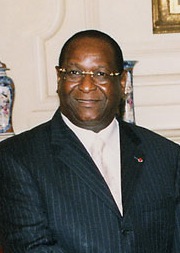Lansana Kouyaté
Lansana Kouyaté (* 1950 in Koba , Guinea ) is a former Guinean diplomat and politician and was Prime Minister of Guinea from March 2007 to May 2008 .
Political career
He studied at the University of Conakry before entering public administration. In 1976 he became a senior employee of the Ministry of Labor, a year later director of the Department of Prices and Statistics in the Ministry of Economic Affairs, where he was responsible for state-owned companies.
In 1982 Koyateé worked on a rice project and then switched to the diplomatic service, where he immediately became part of the Guinean diplomatic corps in the Ivory Coast . In 1985 he returned to the Foreign Ministry, where he was primarily responsible for the affairs of the Organization for African Unity . Two years later he became Guinea's ambassador to Egypt , Jordan , Lebanon , Syria, and Turkey . In 1992 he became Guinea's permanent representative to the United Nations . There he held the office of Vice President of the UN Economic and Social Council .
In 1993 he became Deputy Special Representative of the Secretary General of the UNOSOM II mission in Somalia . In February 1994 he became its first representative. In June 1994 he became Deputy Secretary General in the Political Affairs Division of the UN. One of his first tasks was to visit the ECOWAS member states and discuss the situation in Liberia . He was heavily involved in building regional support to resolve the Liberian Civil War . He held this post until September 1997 when he became Managing Director of ECOWAS . He held this post until February 2002.
During his time at ECOWAS, Kouyaté was awarded the Legion of Honor , among others .
On February 26, 2007, after a general strike under an agreement with the country's trade union opposition, President Lansana Conté selected Kouyaté from a number of senior business leaders and nominated him as prime minister. He was sworn in on March 1, 2007. His cabinet consisted of 19 ministers and state secretaries, none of whom belonged to the old government. In May 2008 he lost his post as Prime Minister to Ahmed Tidiane Souaré . Since his administration had remained unhappy and unsatisfactory among the population and his government had not consisted of a single politician from the opposition parties, his dismissal, unlike his euphoric appointment a year earlier, was hardly objected to by the population.
See also
Web links
- Lansana Kouyaté - Short biography Jeune Afrique, March 3, 2007 (French)
- Cabinet list Kouyaté Jeune Afrique, March 29, 2007 (French)
| personal data | |
|---|---|
| SURNAME | Kouyaté, Lansana |
| BRIEF DESCRIPTION | Guinean politician, prime minister |
| DATE OF BIRTH | 1950 |
| PLACE OF BIRTH | Koba |
